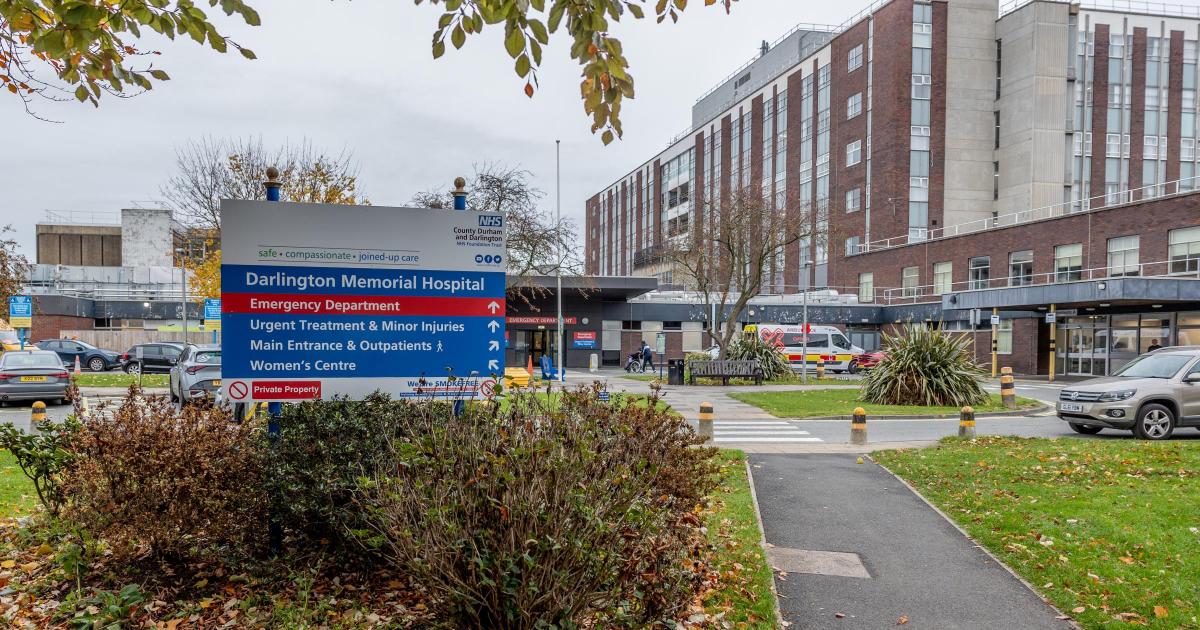Cllr Bryony Holroyd, Green Party shadow cabinet member for health and housing, raised the queries during Darlington Borough Council’s health and housing scrutiny committee meeting on Wednesday (October 29).
Darlington Memorial Hospital sign (Image: SARAH CALDECOTT)
Councillors were left asking how the problem could be fixed, how long it would take, and how much it might cost.
The meeting heard that although cases of Carbapenemase-producing Enterobacteriaceae (CPE), an antibiotic-resistant bacterium, had fallen significantly, one ward at the hospital remains partially affected.
No representatives from the County Durham and Darlington NHS Foundation Trust were present.
Councillor Bryony Holroyd (Image: COUNCIL)
Cllr Holroyd said: “We were left questioning whether, if they reinstated showers and sinks in some wards and there was one case of CPE, the spread would come back.
“While we were made aware that the cases have fallen massively and the issue is now only in one ward, it’s a worry that it’s been going on since 2023.
“You could throw millions of pounds at the hospital in refurbishments, but there’s no guarantee it will solve it. It might be the case that CPE will be in the pipes and workings of the hospital.”
She warned that persistent infection control problems may be linked to the hospital’s ageing infrastructure, adding: “It’s a combination of an old building and CPE has got into the drains.
The frontage of Darlington Memorial Hospital (Image: SARAH CALDECOTT)
“In the worst-case scenario, they’ll have to build another hospital.”
Cllr Holroyd said years of NHS underfunding and austerity have left the hospital’s infrastructure struggling to cope.
“The hospital needs significant investment that they’re going to have to call on from central government,” she said.
The front of Darlington Memorial Hospital (Image: SARAH CALDECOTT)
The committee has written to the NHS Trust to ask what its next steps will be to resolve the issue.
It is due to meet again in January 2026.
A spokesperson for County Durham and Darlington NHS Foundation Trust said it had identified higher-than-usual levels of CPE at Darlington Memorial Hospital in early 2023.
Since 2023, there have been 891 cases of CPE at the hospital.
“Working closely with the UK Health Security Agency and other health partners, we introduced extra cleaning, patient testing, staff training and improvements to some ward showers and sinks, which have helped manage and reduce CPE cases,” the spokesperson said.
Darlington Memorial Hospital entrance (Image: SARAH CALDECOTT)
“As part of these precautions, a few wards have also been asked to offer patients ‘water-light bathing’ with special wipes and shampoo caps that help them stay clean and comfortable. This does not affect the Trust’s incoming water supply.”
The Trust added that it is “sorry to anyone who has been worried or affected by these temporary measures” and thanked staff and patients for their understanding.
While no official figures for how much the CPE issue will cost to fix, the Department of Health and Social Care (DHSC) said it was investing billions into hospitals across the UK.
A spokesperson for the DHSC said: “It is vital that patients have access to the facilities they need whilst in hospital.
The Darlington Memorial Hospital sign (Image: SARAH CALDECOTT)
“This is why we are investing £30 billion over the next five years in day-to-day maintenance and repair of the NHS estate — including internal fixtures and fittings such as showers for patients.”
The situation follows previous water safety issues at the hospital.
In 2021, elevated levels of Legionella bacteria were found in water samples from several areas of Darlington Memorial Hospital during routine testing.
While no infections were recorded, the discovery prompted immediate precautionary measures, including the installation of filters on all cold-water taps and showers.
The reduced water pressure caused by the filters temporarily forced the closure of showers and the birthing pool in the maternity unit.
Skye-Faye Brown (Image: FAMILY)
New mothers were offered alternative facilities on other wards or bathing instead, while work was carried out to restore water access.
Among those affected was Skye-Faye Brown, 23, from Shildon, who gave birth to her daughter Miyah in June 2021.
“I felt awful, and then I wasn’t able to get a shower — it was the worst experience,” she said.
Darlington Memorial Hospital (Image: SARAH CALDECOTT)
“There were covers put over the taps and showers, and access was barred. I had to bring in bottled water just to wash. It left me traumatised.”
The 23-year-old returned to the same hospital this year to give birth to her new child, Koben, and said she had “no issues” on that occasion.
At the time of the Legionella incident, the Trust said: “As part of routine and regular testing of our water supply, elevated levels of Legionella have been detected in several areas across the Darlington Memorial Hospital site.
“We are managing this in line with national guidance. No infections linked to Legionella have been identified either in current or recently discharged patients and we are continuing to closely monitor and assess the situation.”
Since then, infection-control challenges have continued to disrupt patient facilities. Some wards have relied on “waterless bathing” methods, prompting concerns about patient dignity from local MP Lola McEvoy, who has called for “transparency and investment to ensure safe and dignified care.”

